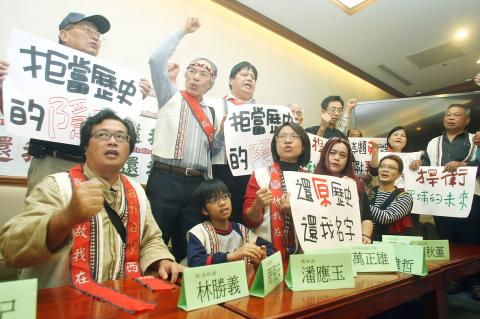Pingpu Aboriginal rights activists yesterday urged the Ministry of the Interior to restore a voluntary annotation that shows their ethnic identity in household registration documents, and the Ministry of Education to recognize Pingpu Aboriginal tribes and their history in the newly revised school curriculum.
More than a dozen Pingpu Aborigines, accompanied by legislators and supporters, shouted: “Give back our history, return our names,” at a press conference at the Legislative Yuan yesterday.
Pingpu (平埔) is a general term used for Aboriginal tribes that inhabited the plains of western Taiwan and who were considered more “assimilated” than Aborigines who lived in mountainous areas or the east coast during the Japanese colonial rule.

Photo: CNA
Until the end of Japanese rule in 1945, the word shou (熟, used to denote “civilized” at the time) was used to mark the “ethnicity” of Pingpu Aborigines on their household registration documents, but the annotation was eliminated when household registration rules were changed.
Saying the deletion of the annotation shou on their household registration was meant to “write off” or “ignore” their ethnic identity, Pingpu Aboriginal rights activists have campaigned for years for the government to officially recognize their ethnic identity.
The activists said the former Tainan county government agreed in 2009 that the Siraya Pingpu Aborigines — a group living mainly in Greater Tainan, as well as parts of Chiayi County and Greater Kaohsiung — could register themselves as Pingpu.
In July last year, the Greater Tainan Government also allowed Pingpu Aborigines whose direct ancestors had shou in their household registration documents in the past to register for the same distinction on their household certificates. This was followed by similar measures in Greater Kaohsiung and Pingtung County, they said.
However, the interior ministry sent a letter to local governments in January asking them to withdraw the distinction.
The ministry’s action is a clear “suppression and violation of our basic human rights by denying even our slightest wish for recognition and self-identity,” they said.
Tainan Pepo Siraya Cultural Association chairwoman Uma Talavan said it is unfair that although the Pingpu were the first to be suppressed by outsiders who landed on the nation’s southwestern coasts and forced to adopt in part the Han culture, the Council of Indigenous Peoples is negating their identity by denying that they are Aborigines.
They also protested against the revised education curriculum for the 12-year compulsory national education program, saying that the Taiwanese history curriculum plans mention the Austronesian-speaking Aborigines in the 16th and 17th centuries, but the Pingpu groups are not included among the Aborigines in the textbooks.
“This is using the term Pingpu to teach students about the population in the earlier centuries, but refusing to tell the history of Pingpu groups,” Talavan said. “Taiwanese history without the history of Pingpu groups is not a true history of our nation.”
They demanded that both the education curriculum and household registration documents recognize that they are Aborigines.
An official from the education ministry’s K-12 Education Administration surnamed Tsai (蔡) said he would convey the activists’ opinions and petitions to the related agencies, and an official from the interior ministry said the ministry only stopped using the word shou on household registration documents in line with a decision by the Council of Indigenous Peoples.

Chinese Nationalist Party (KMT) Chairman Eric Chu (朱立倫), spokeswoman Yang Chih-yu (楊智伃) and Legislator Hsieh Lung-chieh (謝龍介) would be summoned by police for questioning for leading an illegal assembly on Thursday evening last week, Minister of the Interior Liu Shyh-fang (劉世芳) said today. The three KMT officials led an assembly outside the Taipei City Prosecutors’ Office, a restricted area where public assembly is not allowed, protesting the questioning of several KMT staff and searches of KMT headquarters and offices in a recall petition forgery case. Chu, Yang and Hsieh are all suspected of contravening the Assembly and Parade Act (集會遊行法) by holding

PRAISE: Japanese visitor Takashi Kubota said the Taiwanese temple architecture images showcased in the AI Art Gallery were the most impressive displays he saw Taiwan does not have an official pavilion at the World Expo in Osaka, Japan, because of its diplomatic predicament, but the government-backed Tech World pavilion is drawing interest with its unique recreations of works by Taiwanese artists. The pavilion features an artificial intelligence (AI)-based art gallery showcasing works of famous Taiwanese artists from the Japanese colonial period using innovative technologies. Among its main simulated displays are Eastern gouache paintings by Chen Chin (陳進), Lin Yu-shan (林玉山) and Kuo Hsueh-hu (郭雪湖), who were the three young Taiwanese painters selected for the East Asian Painting exhibition in 1927. Gouache is a water-based

Taiwan would welcome the return of Honduras as a diplomatic ally if its next president decides to make such a move, Minister of Foreign Affairs Lin Chia-lung (林佳龍) said yesterday. “Of course, we would welcome Honduras if they want to restore diplomatic ties with Taiwan after their elections,” Lin said at a meeting of the legislature’s Foreign Affairs and National Defense Committee, when asked to comment on statements made by two of the three Honduran presidential candidates during the presidential campaign in the Central American country. Taiwan is paying close attention to the region as a whole in the wake of a

OFF-TARGET: More than 30,000 participants were expected to take part in the Games next month, but only 6,550 foreign and 19,400 Taiwanese athletes have registered Taipei city councilors yesterday blasted the organizers of next month’s World Masters Games over sudden timetable and venue changes, which they said have caused thousands of participants to back out of the international sporting event, among other organizational issues. They also cited visa delays and political interference by China as reasons many foreign athletes are requesting refunds for the event, to be held from May 17 to 30. Jointly organized by the Taipei and New Taipei City governments, the games have been rocked by numerous controversies since preparations began in 2020. Taipei City Councilor Lin Yen-feng (林延鳳) said yesterday that new measures by